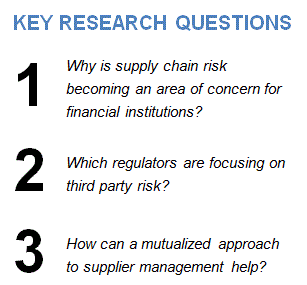Connected Due Diligence: Optimizing the Management of Supply Chain Risk
Abstract
Financial firms rely on an extensive array of external suppliers that provide technology, data, consulting, and professional services. With the growing dependence of financial firms on third party services, regulators are increasing their focus on third party risk.

The growing complexity of supplier relationships makes it challenging for banks to receive timely information from their many third parties to perform required ongoing risk assessments. The redundant effort is substantial from an industry perspective, as dozens of financial institutions seek essentially the same information from thousands of suppliers. This is a key reason why vendors are often hard-pressed to provide adequate information during the RFP or onboarding process. The result for financial institutions is suboptimal supplier data, whether for decisioning or third party risk management purposes.
The emergence of mutualized services in the financial services industry suggests a solution: Connected due diligence, in which an independent supplier provides a common portal to support the operational activities of multiple firms. Third parties need only populate their information once for it to be accessible by multiple financial users of the platform.
This report, commissioned by Markit, sets out the potential benefits of a mutualized third party management platform, including: efficient collection and maintenance of supplier documentation, improved supplier data, increased transparency of supplier offerings, and support for operational risk, including cybersecurity risk.
“The connected due diligence approach can help elevate the industry to a higher standard, and remove some of the risk inherent in go-it-alone standards creation,” said Neil Katkov, PhD, senior vice president, Asia, and author of the report.

